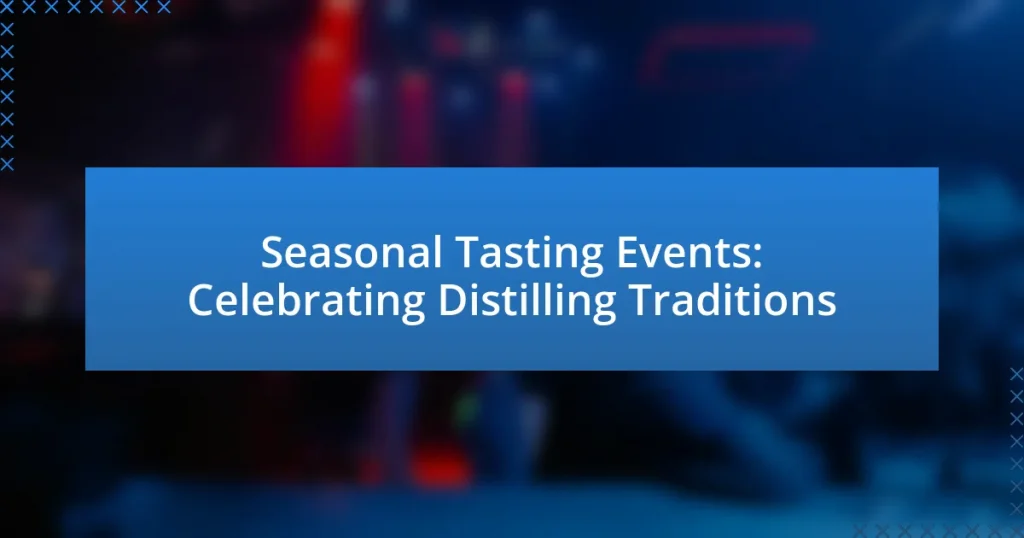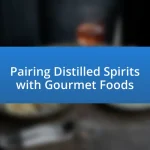Seasonal Tasting Events are organized gatherings that highlight specific seasonal beverages, showcasing local distilling traditions through tastings of spirits, cocktails, and food pairings. These events celebrate the craftsmanship behind local spirits, offering attendees the chance to engage with distillers and learn about the distillation process. The selection of spirits is influenced by seasonal flavors, with events often featuring a variety of products such as whiskey, rum, and gin, paired with complementary foods. Additionally, these events play a crucial role in preserving distilling culture and fostering community engagement, providing immersive experiences that enhance appreciation for craft beverages.
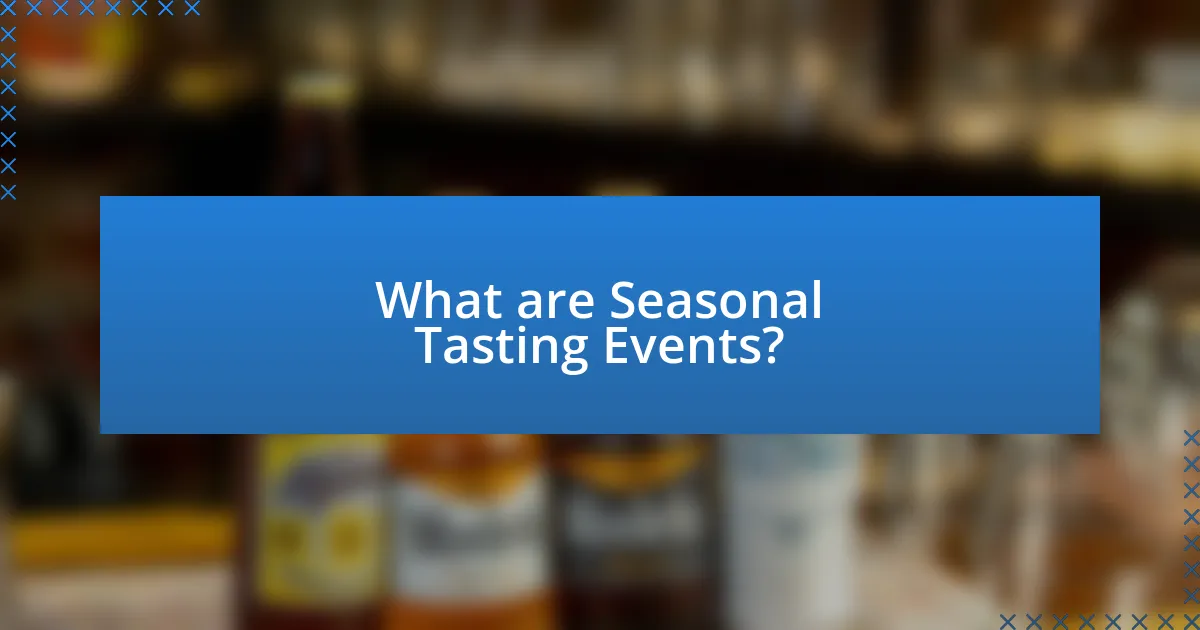
What are Seasonal Tasting Events?
Seasonal Tasting Events are organized gatherings that showcase and celebrate specific seasonal beverages, often highlighting local distilling traditions. These events typically feature tastings of spirits, cocktails, and food pairings that reflect the flavors and ingredients of the season, such as autumn harvest or summer fruits. They provide an opportunity for attendees to experience unique offerings from various distilleries, learn about the distillation process, and engage with producers. Seasonal Tasting Events often attract enthusiasts and connoisseurs, fostering a community around the appreciation of craft beverages.
How do Seasonal Tasting Events celebrate distilling traditions?
Seasonal Tasting Events celebrate distilling traditions by showcasing local spirits and the craftsmanship behind their production. These events often feature tastings of seasonal products, allowing attendees to experience the unique flavors that reflect the time of year and regional ingredients. For example, autumn events may highlight whiskey made from locally sourced grains, emphasizing traditional distillation methods that have been passed down through generations. Additionally, these gatherings often include educational components, such as workshops or talks by distillers, which provide insights into the history and techniques of distilling, reinforcing the cultural significance of these practices.
What types of spirits are typically featured in these events?
Seasonal tasting events typically feature a variety of spirits, including whiskey, rum, gin, vodka, and liqueurs. These events celebrate distilling traditions by showcasing local and artisanal producers, allowing attendees to sample unique flavors and styles. For instance, whiskey tastings often highlight regional distilleries, while rum events may focus on Caribbean varieties, illustrating the diversity and cultural significance of each spirit type.
How do the seasons influence the selection of spirits?
Seasons significantly influence the selection of spirits by dictating flavor profiles and consumption preferences. For instance, during winter, consumers tend to favor rich, warming spirits like spiced rums and dark whiskeys, which complement the colder weather. In contrast, summer sees a rise in the popularity of lighter, refreshing spirits such as gin and vodka, often used in cocktails that are served chilled. This seasonal shift is supported by market trends indicating that sales of specific spirits fluctuate with temperature changes, as consumers seek beverages that align with their seasonal experiences and activities.
Why are Seasonal Tasting Events important for distilling culture?
Seasonal Tasting Events are important for distilling culture because they serve as a platform for showcasing regional spirits and fostering community engagement. These events highlight the unique characteristics of local ingredients and distillation techniques, allowing consumers to appreciate the craftsmanship involved. For instance, events often feature seasonal products that reflect the harvest cycles, promoting a deeper understanding of the relationship between agriculture and distilling. Additionally, they create opportunities for distillers to connect with consumers, share stories, and educate attendees about the history and traditions of their craft, thereby preserving and promoting cultural heritage within the distilling industry.
What role do these events play in preserving distilling traditions?
Seasonal tasting events play a crucial role in preserving distilling traditions by providing a platform for artisans to showcase their craft and engage with the community. These events facilitate the sharing of knowledge and techniques among distillers, ensuring that traditional methods are passed down through generations. For example, events often feature workshops and demonstrations that highlight historical distilling practices, allowing attendees to learn about the cultural significance and craftsmanship involved. Additionally, the promotion of local spirits at these gatherings fosters appreciation for regional distilling heritage, reinforcing the importance of maintaining these traditions in a modern context.
How do they foster community engagement and appreciation?
They foster community engagement and appreciation through interactive seasonal tasting events that celebrate local distilling traditions. These events invite community members to participate in tastings, workshops, and discussions, allowing them to connect with local distillers and learn about the craft. For instance, events often feature guided tastings led by distillers who share their expertise and stories, enhancing the community’s understanding and appreciation of the local distilling heritage. Additionally, these gatherings promote local products, encouraging attendees to support nearby businesses, which strengthens community ties and fosters a sense of belonging.
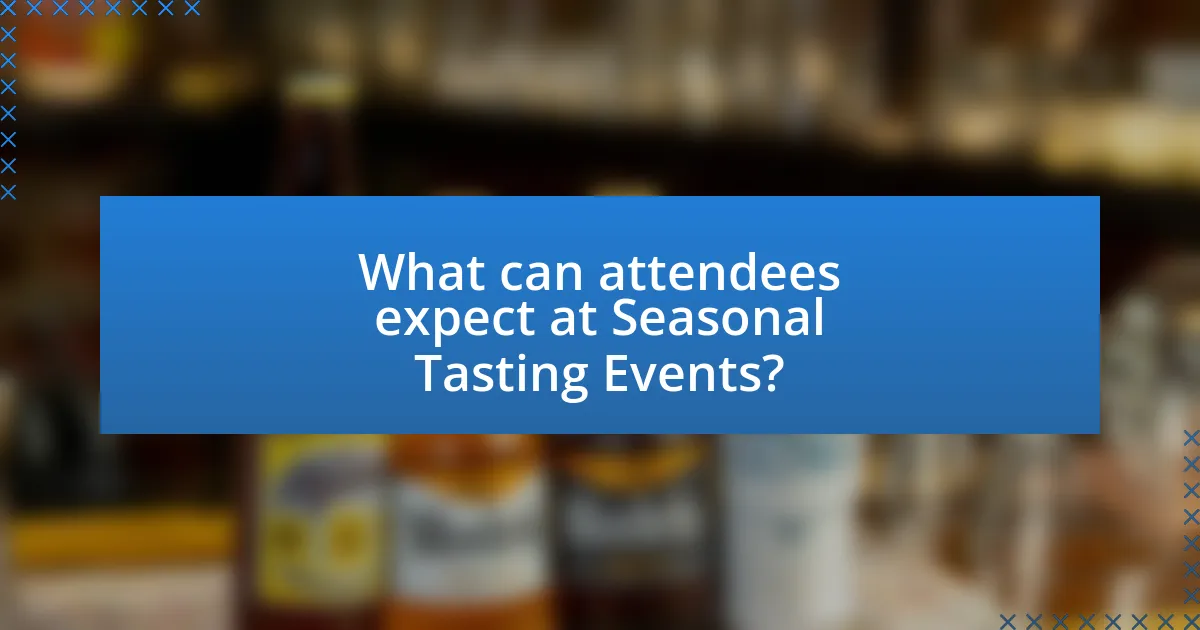
What can attendees expect at Seasonal Tasting Events?
Attendees at Seasonal Tasting Events can expect a curated experience showcasing seasonal beverages that highlight local distilling traditions. These events typically feature tastings of various spirits, including seasonal cocktails and specialty drinks crafted from locally sourced ingredients. Additionally, attendees may engage with distillers who provide insights into the production processes and the unique characteristics of the spirits being sampled. The events often include food pairings that complement the beverages, enhancing the overall tasting experience.
How are Seasonal Tasting Events organized?
Seasonal Tasting Events are organized through a structured process that involves planning, coordination, and execution. Organizers typically begin by selecting a theme that aligns with the season, such as harvest or holiday celebrations, and then curate a selection of beverages that reflect this theme. They secure a venue that can accommodate attendees and create an inviting atmosphere, often incorporating elements of the distilling tradition being celebrated.
Marketing efforts are then implemented to promote the event, utilizing social media, local advertising, and partnerships with distilleries to attract participants. On the day of the event, logistics such as setup, staffing, and ensuring compliance with health and safety regulations are managed to provide a seamless experience for attendees.
The success of these events is often measured by attendance numbers and participant feedback, which can inform future events and enhance the overall experience.
What are the key components of a successful tasting event?
The key components of a successful tasting event include a well-curated selection of products, knowledgeable staff, an inviting atmosphere, and effective marketing. A well-curated selection ensures that attendees experience a variety of flavors and styles, which enhances their overall enjoyment and education about the products. Knowledgeable staff can provide insights and answer questions, enriching the tasting experience and fostering engagement. An inviting atmosphere, characterized by comfortable seating and appropriate lighting, encourages social interaction and enjoyment. Effective marketing, through social media and local outreach, attracts a diverse audience and increases attendance, which is crucial for the event’s success.
How do venues and locations impact the experience?
Venues and locations significantly impact the experience of seasonal tasting events by influencing ambiance, accessibility, and sensory engagement. For instance, a rustic distillery setting enhances the authenticity of the tasting experience, allowing participants to connect with the distilling traditions being celebrated. Research indicates that environments with natural elements, such as wood and greenery, can elevate mood and enjoyment levels, as shown in studies by Kaplan and Kaplan on environmental psychology. Additionally, the location’s accessibility affects attendance and participation; venues that are easy to reach tend to attract larger crowds, thereby enriching the communal aspect of the event. Overall, the choice of venue and location directly shapes the overall enjoyment and engagement of attendees at tasting events.
What experiences are offered during these events?
Seasonal tasting events offer immersive experiences that include guided tastings of various distilled spirits, educational sessions on distilling techniques, and opportunities to meet local distillers. Participants engage in sampling unique seasonal flavors, often paired with food, enhancing the tasting experience. These events also frequently feature live demonstrations of the distillation process, allowing attendees to gain insights into the craftsmanship behind their favorite spirits.
What types of tastings and pairings are commonly featured?
Commonly featured tastings and pairings include whiskey tastings paired with artisanal cheeses, craft beer tastings alongside gourmet chocolates, and wine tastings complemented by charcuterie boards. These pairings enhance the sensory experience, allowing participants to appreciate the distinct flavors and aromas of each beverage in conjunction with food. For instance, whiskey’s complex notes can be accentuated by the creaminess of certain cheeses, while the bitterness of craft beer can be balanced by the sweetness of chocolate.
How do educational sessions enhance the tasting experience?
Educational sessions enhance the tasting experience by providing participants with in-depth knowledge about the products being tasted, including their origins, production methods, and flavor profiles. This understanding allows attendees to appreciate the nuances of each tasting, leading to a more engaged and informed experience. For instance, research shows that consumers who receive educational content during tastings report higher satisfaction levels and a greater willingness to purchase products, as they feel more connected to the brand and its story.
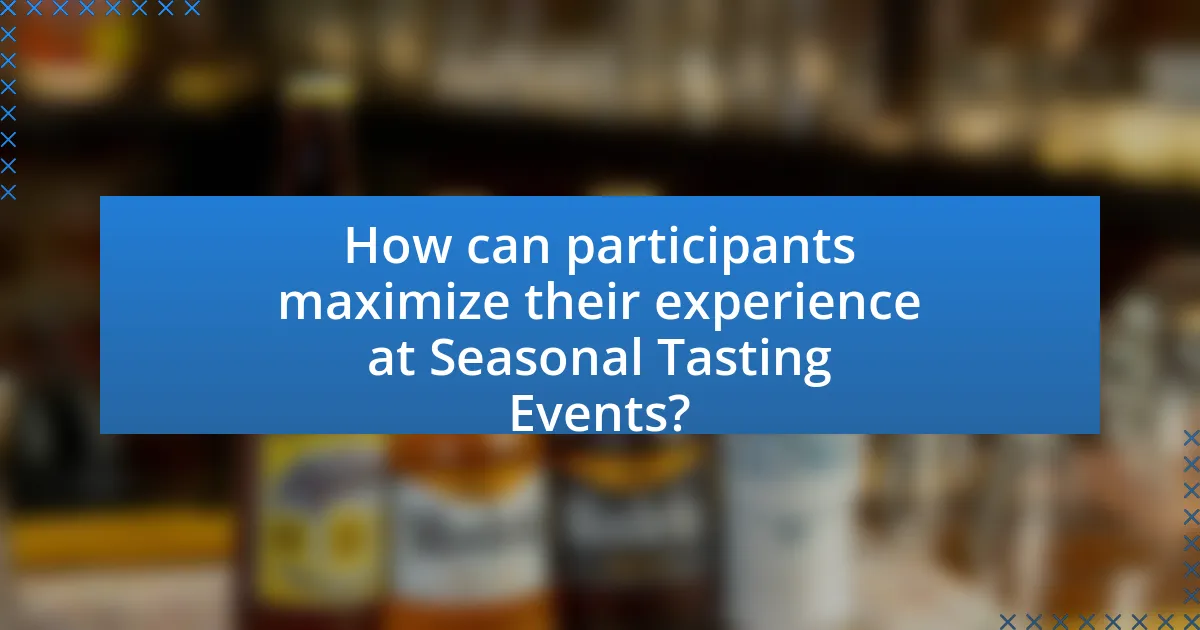
How can participants maximize their experience at Seasonal Tasting Events?
Participants can maximize their experience at Seasonal Tasting Events by actively engaging with the offerings and utilizing available resources. Engaging with distillers and staff enhances understanding of the distilling process and product nuances, while attending guided tastings provides structured insights into flavor profiles. Additionally, taking notes during tastings helps participants remember their preferences and experiences. Research indicates that active participation in tasting events leads to a deeper appreciation of the craft, as noted in studies on consumer behavior in experiential marketing.
What tips should attendees follow for a successful tasting experience?
Attendees should arrive with an open mind and a clear palate for a successful tasting experience. This means avoiding strong flavors or scents prior to the event, such as strong perfumes or heavily flavored foods, which can interfere with the tasting process. Additionally, attendees should take notes on each sample to remember their impressions, as this helps in recalling preferences later. It is also beneficial to engage with the presenters to gain insights about the distilling process and the specific characteristics of each sample, enhancing the overall understanding and enjoyment. Finally, pacing oneself is crucial; sipping slowly allows for a more thorough appreciation of the flavors and aromas, contributing to a richer tasting experience.
How can participants effectively choose which spirits to sample?
Participants can effectively choose which spirits to sample by considering their personal preferences, the flavor profiles of the spirits, and recommendations from experts. Understanding individual taste preferences, such as whether one enjoys sweeter or more robust flavors, helps narrow down options. Additionally, participants should explore the flavor profiles of different spirits, such as the distinction between whiskey, rum, and gin, to identify what appeals to them. Expert recommendations, often provided by distillers or knowledgeable staff at tasting events, can guide participants toward high-quality selections that align with their tastes. This approach ensures a more enjoyable and tailored tasting experience.
What should attendees know about responsible tasting practices?
Attendees should know that responsible tasting practices involve moderation, awareness of alcohol content, and the importance of hydration. Moderation ensures that individuals enjoy the tasting experience without overconsumption, which can lead to negative health effects. Awareness of alcohol content helps attendees make informed decisions about their intake, as different beverages can vary significantly in strength. Hydration is crucial, as drinking water between tastings can mitigate the effects of alcohol and enhance the overall experience. These practices are supported by health guidelines that recommend limiting alcohol consumption to reduce risks associated with drinking.
What are the best practices for hosting a Seasonal Tasting Event?
The best practices for hosting a Seasonal Tasting Event include selecting a theme that reflects the season, curating a diverse selection of seasonal beverages, and ensuring proper food pairings. A well-defined theme enhances the guest experience by creating a cohesive atmosphere, while a diverse selection allows attendees to explore various flavors and styles that are representative of the season. Proper food pairings are essential as they complement the beverages, enhancing the overall tasting experience. Additionally, providing educational elements, such as tasting notes or background information on the beverages, can enrich the event and engage participants. These practices are supported by industry standards that emphasize the importance of thematic consistency and guest engagement in successful tasting events.
How can hosts create an engaging atmosphere for attendees?
Hosts can create an engaging atmosphere for attendees by incorporating interactive elements such as tastings, demonstrations, and storytelling. These activities encourage participation and foster a sense of community among attendees. For example, offering guided tastings allows guests to explore different flavors and learn about the distilling process, enhancing their overall experience. Additionally, incorporating local traditions and cultural narratives related to the spirits being showcased can deepen attendees’ connection to the event. Research indicates that interactive experiences significantly increase attendee satisfaction and retention, making them more likely to return for future events.
What considerations should be made for selecting spirits and food pairings?
When selecting spirits and food pairings, consider the flavor profiles of both the spirit and the food to ensure they complement each other. For instance, a smoky whiskey pairs well with grilled meats, while a citrusy gin enhances seafood dishes. Additionally, consider the intensity of the spirit; stronger spirits can overpower delicate flavors, so balance is key. The seasonality of ingredients also plays a role; pairing seasonal foods with spirits that reflect the same season can enhance the overall tasting experience. Research indicates that successful pairings often rely on matching or contrasting flavors, such as sweet spirits with spicy foods, to create a harmonious balance.
